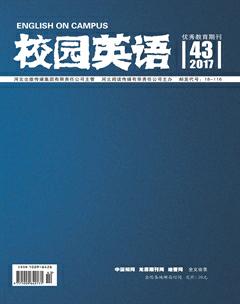雅思大作文段落寫(xiě)作之“TEER”四步法
【摘要】在21世紀(jì)的今天,教育全球化已然成為了一個(gè)不可逆轉(zhuǎn)的趨勢(shì)。根據(jù)中國(guó)教育部的相關(guān)數(shù)據(jù),近年來(lái)中國(guó)赴海外求學(xué)學(xué)生的數(shù)量一直保持增長(zhǎng)趨勢(shì)。諸多學(xué)生在備考語(yǔ)言考試即雅思(IELTS)的過(guò)程中尤其在寫(xiě)作板塊問(wèn)題較為突出。本文將重點(diǎn)講解針對(duì)雅思寫(xiě)作中的大作文較為有效的“TEER”四步法。
【關(guān)鍵詞】雅思寫(xiě)作 “TEER”四步法
一、雅思大作文題型分析
(1)議論文(argumentation)
1) 給出一種觀點(diǎn)——(To what extent) do you agree or disagree?
Creative artists should always be given the freedom to express their own ideas(in words, pictures, music or film) in whichever way they wish. There should be no government restrictions on what they do.
To what extent do you agree or disagree with this opinion?
— From Test 3 of Cambridge 4
2) 給出兩種對(duì)立的觀點(diǎn)——Discuss both views and give your own opinion.
It is generally believed that some people are born with certain talents, for instance for sport or music, and others are not. However, it is sometimes claimed that any child can be taught to become a good sports person or musician.
Discuss both these views and give your own opinion.
— From Test 1 of Cambridge 7
3) 分析優(yōu)缺點(diǎn)——Do you think the advantages/ benefits outweigh its disadvantages/ problems?
Many museums charge for admission while others are free.
Do you think the advantages of charging people for admission to museums outweigh the disadvantages?
— From Test 4 of Cambridge 10
(2)報(bào)告(report)
給出一種現(xiàn)象——causes/effects/solutions
In some countries the average weight of people is increasing and their levels of health and fitness are decreasing.
What do you think are the causes of these problems and what measures could be taken to solve them?
— From Test 4 of Cambridge 8
二、“TEER”四步法理論概述
根據(jù)雅思官方的評(píng)分標(biāo)準(zhǔn),在雅思寫(xiě)作中考生需要注意的基本問(wèn)題如下:寫(xiě)作任務(wù)回應(yīng)情況、連貫與銜接、詞匯豐富程度、語(yǔ)法多樣性及準(zhǔn)確性。鑒于此,在具體段落寫(xiě)作中,考生在段落結(jié)構(gòu)上可采用“TEER”四步法來(lái)應(yīng)對(duì)。
T:Topic sentence。段落首句,旗幟鮮明地提出核心論點(diǎn),為該段后續(xù)的論證打下基礎(chǔ)。
論點(diǎn)的提出分為從第一人稱和第三人稱的視角提出。具體而言,如若從第一人稱視角,常用的基本句型為:介詞性短語(yǔ)如“as far as I am concerned/as I see it/from my perspective/in my point of view/from where I stand/personally speaking/in my opinion/as for me/in my eyes/according to my knowledge”和賓語(yǔ)從句如“I (firmly/strongly/earnestly) believe/hold/reckon/deem/consider/feel that...”。
E:Explanation。第二句對(duì)核心論點(diǎn)進(jìn)行理論上地展開(kāi)講解和補(bǔ)充,為之后的例證做好鋪墊。
理論展開(kāi)在一定程度上也可以稱作理論論證,故而在這一步可以使用其他具體的理論論證方法,如對(duì)比論證、因果論證、假設(shè)論證等。考生在這一步可常用的句型表達(dá)有“in other words/to be specific/to be exact/to put it in another way/by this I mean/what it means is that...”。
E:Exemplification。采用例證法對(duì)前文的論點(diǎn)進(jìn)行進(jìn)一步實(shí)際論證,以達(dá)到有理有據(jù)的論證效果。
第三步的例證法是為了實(shí)現(xiàn)理論加實(shí)際的論證結(jié)構(gòu),以至于整個(gè)文章不會(huì)太過(guò)空洞,也不至于落入純粹說(shuō)理的俗套。但是,考生需要注意的是,這個(gè)過(guò)程中的例證無(wú)需從細(xì)節(jié)入手進(jìn)行大篇幅的舉例說(shuō)明,更提倡以點(diǎn)帶面式的例證手段。這一環(huán)節(jié)中比較提倡的地道表達(dá)有“for example/for instance/a case in point is.../...is a typical example/take...as an example”。
R:Reinforcement。段末可進(jìn)一步強(qiáng)化論點(diǎn),增加說(shuō)服力。
段末的強(qiáng)化句實(shí)則也是為了加強(qiáng)論證效果,但是在具體操作過(guò)程中,這一步可根據(jù)需要自行調(diào)整或舍棄,因?yàn)槿绻拔牡娜疥U釋到位,即使沒(méi)有強(qiáng)化句一樣已然達(dá)到了說(shuō)理充分、論證有效的目的。總結(jié)性或強(qiáng)調(diào)性的相關(guān)表達(dá)如“thats why.../therefore/in conclusion”等都可以用在段末這一步。
三、案例分析
該部分案例分析采用本文第一部分依次出現(xiàn)的各類題型原題。
議論文:
(1) There is no denying that without any governmental restrictions the works of some artists might be of adverse impacts on certain members of the society. (T) To be exact, those adolescents who are lack of the ability to accurately distinguish right from wrong are vulnerable to some contents in the works. (E) For instance, out of curiosity they are very likely to imitate some violent or pornographic conducts presented in different forms of arts. (E) Therefore, thats why it is indeed necessary for the government to effectively control what artists try to show and express. (R)
(2) I personally believe that some people do have talents that are probably inherited via their genes. (T) Such talents can give individuals a facility for certain skills that allow them to excel while more hard-working students never manage to reach a comparable level. (E) Excellent examples are great musicians like Beethoven and professional sports players such as Phelps because their incomparable born aptitude has offered a desirable foundation for the further career development. (E) Hence it has to be admitted that without the natural talent, continuous training would be neither attractive nor productive. (R)
(3) The first and foremost reason given by opponents of charging for museum admissions is that this will deprive all citizens of the right to familiarize themselves with culture and history. (T) In other words, the charge is believed to keep some underprivileged citizens out of the museum halls. (E) In this way, for example, a child from a not well-off family background is sure to miss the chance to authentically get close to the exhibits and know more about the related culture and history. (E) In order to present all community members a fair chance to know the culture and history of human civilization, all should be entitled free access to museums. (R)
報(bào)告:
The first factor contributing to the average weight increase and health level decline, as far as I am concerned, is the unhealthy dietary structure todays people keep. (T) To be specific, nowadays an increasing number of people tend to have unbalanced or even undesirable eating habits. (E) For instance, they cannot resist the temptation of fast food which is certainly rich in fat and calorie, and sometimes due to the tightened work schedule they are likely to neglect meals or have them at an irregular time. (E) By and by these habits easily generate some health problems as mentioned above. (R)
四、結(jié)語(yǔ)
通過(guò)理論闡釋和案例呈現(xiàn),我們會(huì)發(fā)現(xiàn)“TEER”這樣的四步段落寫(xiě)作法比較符合邏輯,也能夠較好地達(dá)到雅思官方對(duì)于寫(xiě)作板塊的要求,且對(duì)于任何水平的備考者而言都比較容易入手。但是,必須指出的是,文中所給案例中的具體句型詞匯并非固定要求和單一程式,而是僅供參考的范本。最后,雅思寫(xiě)作部分的得分跟考試人員其他諸多方面的能力緊密掛鉤,如詞匯量、語(yǔ)法熟悉度、個(gè)人基本知識(shí)儲(chǔ)備等。
參考文獻(xiàn):
[1]李霞.雅思寫(xiě)作常見(jiàn)問(wèn)題與備考策略研究[J].課程教育研究, 2017,02.
[2]盧瀟穎.基于翻轉(zhuǎn)課堂的雅思寫(xiě)作課程設(shè)計(jì)[J].佳木斯職業(yè)學(xué)院學(xué)報(bào),2015,09.
[3]胡娟.建構(gòu)主義在雅思寫(xiě)作教學(xué)中的應(yīng)用[J].長(zhǎng)江大學(xué)學(xué)報(bào)(社科版),2014,12.
作者簡(jiǎn)介:陳希東(1988-),男,漢族,碩士,助教,研究方向:語(yǔ)言學(xué)及英語(yǔ)教學(xué)。

